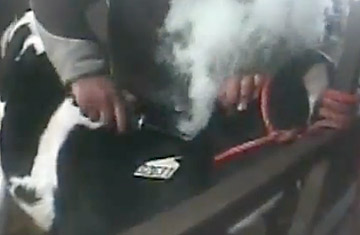
A still taken from a video released by the animal-rights group Mercy for Animals shows a calf having its horns burned off
On Nov. 23, 2010, in Cayuga County, New York, Phil Niles pleaded guilty to animal cruelty. He was ordered to pay a fine of $555 and to not have contact with animals for one year. Niles, who had been a longtime employee of Willet Dairy, had been caught hitting a cow on the head with a tool in an undercover video taken by the group Mercy for Animals in 2009.
But some are moving to make that very method of gathering evidence of animal abuse illegal. On June 2, the New York state senate agriculture committee approved a bill that "relates to unlawful tampering with farm animals." Included as "tampering" — alongside such acts as injecting animals with unauthorized substances and feeding animals without authorization — is "unauthorized video, audio recording or photography done without the farm owner's written consent." Those in violation could serve up to a year in jail or pay a $1,000 fine and could be held liable for damages. In other words, someone who strikes a cow on the head, in clear violation of animal-cruelty laws, could receive a lighter punishment than someone who points a camera at the abuser.
The controversial bill, which was introduced by agriculture-committee chair Patty Ritchie, a Republican, at the request of the New York Farm Bureau (NYFB), has spawned a Humane Society action alert and a visit to the capital by People for the Ethical Treatment of Animals (PETA), which often publicizes videotapes of farm-animal abuse. PETA's senior vice president, Dan Mathews, says the measure would stymie law enforcement; state senator Tony Avella, one of two committee members who voted against it, agrees. Avella, a Democrat, objected to the filming clause because, he says, "This is how we document cases of animal abuse." The legislation is similar to other "ag-gag" measures introduced this year in Iowa, Florida and Minnesota that have been widely criticized as unconstitutional and an impediment to whistle-blowing.
One difference with the Empire State's bill appears to be its intent. According to the NYFB, the legislation stems from terrorism concerns; in a statement, Ritchie said the group "asked me to introduce this bill to help insure the safety and integrity of the state's food supply." A memo attached to S5172 repeatedly cites the Department of Homeland Security and, under the heading "Justification," refers to "several recent instances of animal and facility tampering (the unlawful injection of cattle with antibiotics in western New York, and the increasing theft of anhydrous ammonia fertilizer, utilized by meth addicts to make illegal substances)."
However, Ritchie's spokesman, Jim Reagen, acknowledges that it would be difficult to find "several recent instances." When TIME asked whether the illegal injection of cattle with antibiotics is indeed a big problem in New York, Reagen didn't hesitate before saying, "No." Stealing anhydrous ammonia is already a felony under the state penal code.
Regardless, what does the bill's clause about banning cameras have to do with ensuring food safety? After all, undercover videos in some states have actually revealed not just animal abuses but also unsanitary farming conditions.
True, the New York division of homeland security and emergency services, in conjunction with the state department of agriculture and markets, has sponsored a security poster that says that "unauthorized photography in or around the facility or farms" should raise a red flag about sabotage of the food supply. But these authorities were not necessarily advocating that such photography be made illegal. When asked about the bill, Dennis Michalski, the division of homeland security's public-information officer, told TIME his department wasn't in a position to comment because it was unfamiliar with S5172. "You caught a lot of us by surprise, because we weren't aware of the legislation," Michalski said.
Reagen noted that people could use cameras to prepare for a terrorist attack involving the food supply. "But," he added, "we both know that isn't the only issue that's involved here. There's also the concerns by the ag community about strangers coming onto their property."
